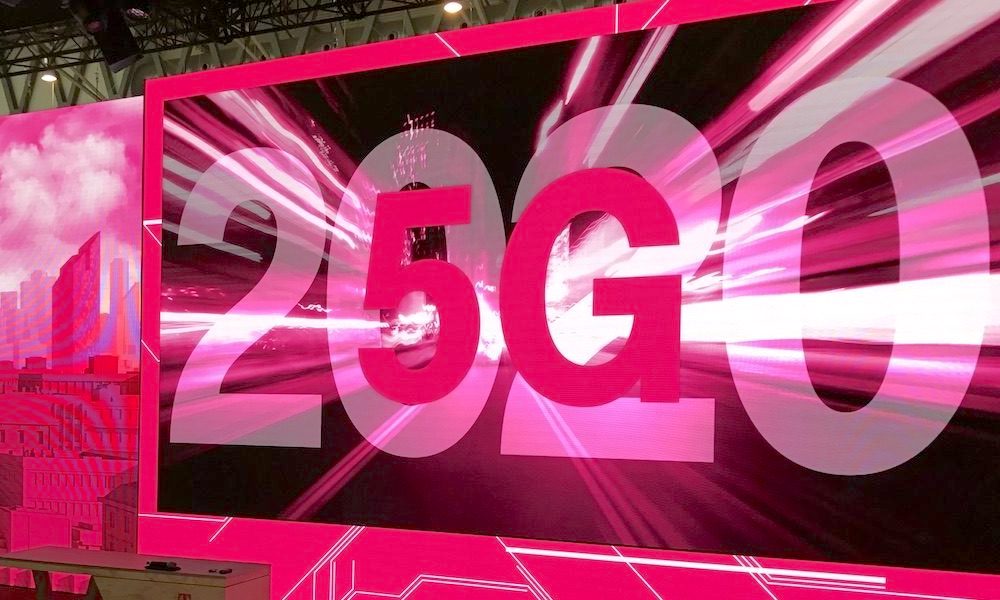T-Mobile Launching 5G Nationwide on December 6
 Credit: T-Mobile
Credit: T-Mobile
Toggle Dark Mode
The high-speed 5G networks that will support next year’s iPhones are slowly becoming more of a reality, with T-Mobile announcing that it’s prepared to launch its nationwide 5G network on December 6th.
Although T-Mobile has already been following the lead of other carriers like Verizon in rolling out its shorter-range 5G network based on mmWave technology in a few cities, this latest move involves its largest 5G rollout yet, bringing a 600 MHz 5G network to 5,000 cities and towns nationwide.
The announcement comes in the midst of a massive $26 billion merger with Sprint that was just green-lit by the U.S. Federal Communications Commission, but with the condition that The New T-Mobile — the name for the new collective — will provide 90 percent of Americans with access to high-speed mobile data at 100 Mbps or better within six years.
However, since the two carriers have already pledged to roll out 5G service to cover 97 percent of Americans within three years, this doesn’t seem to be too much of a stretch.
In fact, this new nationwide rollout is the first major step in this plan, which will see the new network cover over 200 million customers in 5,000 cities and towns as soon as it launches, while hitting speeds of up to 450 Mbps by 2024.
While this is far from the maximum speed that 5G promises to ultimately deliver with shorter-range mmWave technology, it’s likely to be more than sufficient for mobile device users in the near term, and the 600 MHz implementation provides greater range and better in-building coverage, making it far more suitable for a nationwide deployment like this.
While there aren’t a lot of devices that support T-Mobile’s 5G network right now — in fact, the company only sells two 5G phones — Apple is almost certainly going to release its 5G iPhones next fall, which will give the carriers and other hardware manufacturers more than enough time to deploy their networks properly, work out the bugs, and guarantee that they’ll be able to provide reliable 5G coverage to the vast majority of iPhone users, rather than just those in relatively few urban centres.
In fact, Apple could even be bringing 5G MacBooks to the table by the end of the next year, creating a more ubiquitous way of staying online on the go without the need to rely on Wi-Fi hotspots in bookstores and coffee shops, and with even the slower 600 MHz 5G promising speeds that rival most home broadband connections, we’ll soon be entering a world where the internet no longer needs to run into your home via wires or even fibre-optic cables.
‘5G for Good’
While some carriers can be expected to make 5G more expensive, T-Mobile is already planning a big step in the other direction, announcing a new Connecting Heroes initiative in which it has committed to providing free 5G service, with unlimited talk, text, and smartphone data, for all U.S. first responder agencies for the next ten years. This basically involves connecting every public and nonprofit state and local police, fire, and EMS agency and their first responders to the 5G network and also ensuring that their calls and data are given the highest network priority.
In fact, T-Mobile CEO John Legere says that if all of the agencies in the U.S. sign up, that would result in $7.7 billion in savings over the next few years, which is only that they can put toward “better pay” and “life-saving tools.”
Despite the formal FCC approval for the merger, however, there is still one last major hurdle that The New T-Mobile needs to overcome before it can be a reality — a lawsuit from 18 state attorneys general has been seeking to block the merger, calling it anticompetitive and harmful to consumers.
It seems that most of the promises that T-Mobile is making right now are conditional on the merger closing. In fact, it’s explicitly stated on its website that the Connecting Heroes Initiative will only exist if the merger closes — something that’s also undoubtedly on offer in order to sell the states on the idea — and the same is also likely true for the wider 5G rollout, since it’s almost certain to need Sprint’s resources and spectrum in order to actually pull this off.






